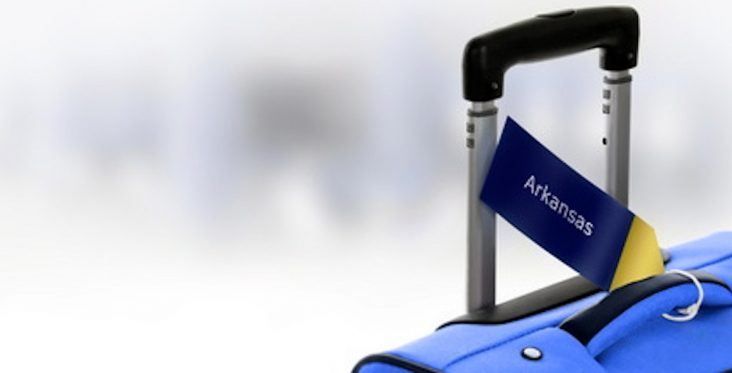Food vendor revenue on rise at XNA, Clinton National Airport
by September 11, 2017 4:09 pm 464 views

Arkansas. Blue suitcase with label at airport.
A rise in enplanements and sales at food venues are driving an increase in food and beverage revenue at Northwest Arkansas Regional Airport (XNA).
Food and beverage revenue has increased 16% to $413,282, in the first half of the year, from the same period in 2016. The revenue comes from a percentage of sales of the food and beverage vendors. The revenue generated is set by benchmarks in each vendor contract and ranges between 5.5% and 15.5% of sales, airport director Kelly Johnson said.
Enplanements, or departing passengers, have risen 5% to 332,902 in the first half of the year, from the same period in 2016. Also, food venues, including Core Brewing Co. pub and Auntie Anne’s pretzel shop, have opened in the past year. Paradise has been the master concessionaire for establishments at the airport since the expanded concourse opened in fall 2011.
For comparison, enplanements at Bill and Hillary Clinton National Airport in Little Rock have risen 2% to 498,552 in the first half of the year, from the same period in 2016. Its food and beverage revenue rose 4% to $376,907 in the first half of the year from the same period in 2016. The revenue is generated from a percentage of sales, ranging between 5% and 17%.
Recently, the airport announced a Chick-fil-A and a Chili’s would open in the first quarter of 2018 as part of a $25 million concourse improvement project. According to the airport, it replaced gate seating with 802 seats, offering USB and power outlets, and is the first in the nation to feature in-seat power at every gate.
Enplanements at Fort Smith Regional Airport have risen 5% to 43,824 in the first half of the year, from the same period in 2016. It doesn’t receive revenue from food and beverage sales, but it might if the sales reached a certain amount. Airport director Michael Griffin said the airport doesn’t have a lot of passenger loiter time, and the majority of Fort Smith restaurants are within a half-mile of the airport.
“It’s for us about providing service for the passengers,” Griffin said.
XNA REVENUE DETAILS
Through June, XNA had expected food and beverage revenue to be $220,862. The revenue is part of the broader terminal revenue, which includes advertising and the Transportation Security Administration. Terminal revenue, the airport’s fourth largest operating revenue source, has risen 12% to $786,249, from the same period in 2016.
The largest portion of operating revenue comes from parking, which has risen 8% to $2.833 million. Second, airline revenue has increased 11% to $2.757 million. Third, car rental revenue is up 3% to $1.376 million.
Through June 30, the airport’s total operating revenue has increased 7% to $8.226 million. That’s about 6% more revenue than the airport had planned for, which was $7.692 million.
As for non-operating revenues, passenger facility charges, which is capped at $4.50 per flight, have risen 4% to $1.458 million, and customer facility charges, or rental car fees, have risen 62% to $828,924 after a $1.25 rate increase to $4.75. Total non-operating revenue has fallen 5% to $3.534 million, from $3.746 million. Grant reimbursements are down 32% to $1.246 million.
Expenses have risen more than 33% to $3.705 million, and are over budget by about 4%. The majority of the rise can be attributed to contract services, which is up 119% to $809,343. About $306,872 of that amount is attorney fees. The airport has been going through a mediation with larger carriers regarding the per-turn charge, or an operations fee, that low-cost carrier Allegiant pays. Larger carriers aren’t charged a per-turn rate but pay a gate rental fee. Allegiant doesn’t pay a gate rental fee. The airport has proposed raising the per-turn fee by $51, or about $11,000 to $12,000 annually, and Allegiant has agreed to that.
“We won’t have any risk of losing any air service, or being consider for new routes because of this change in the rates, if it, in fact, happens,” Johnson said.
But if approved by the larger carriers, it also must be approved by the Northwest Arkansas Regional Airport Authority, which meets again Oct. 18. Johnson expects the airport to recoup the cost of mediation through airline charges in the next year.
